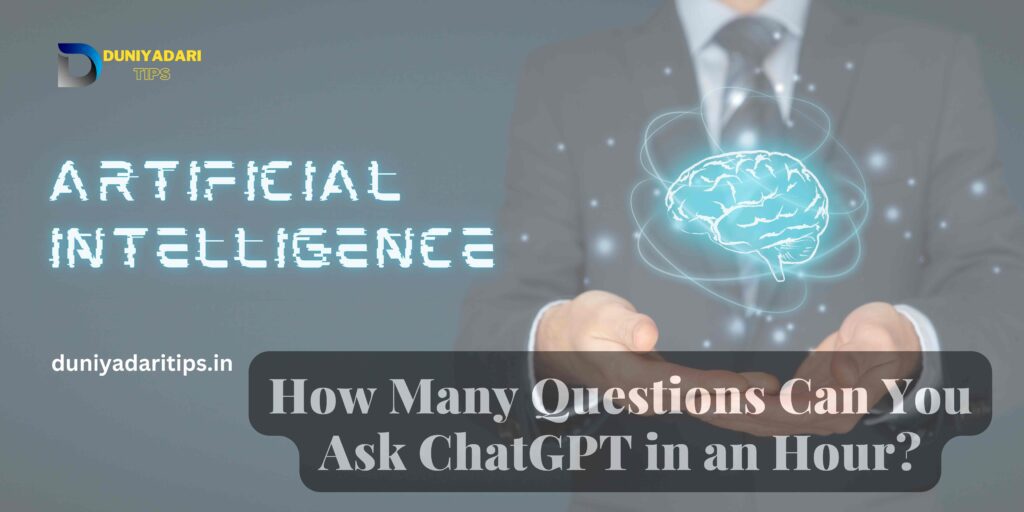Introduction
In this digital world, artificial intelligence has become an most important part of our life, assisting us in various tasks and providing information at our fingertips. ChatGPT, a language model developed by OpenAI, is one such AI tool that allows users to interact and ask questions and find intresting answers.
In this artical we discuss about How Many Questions Can You Ask ChatGPT in an Hour?

Understanding the Capabilities of ChatGPT
ChatGPT is a most popular and intresting computer program that answer like a human. It can give you very helpful facts, answer your questions like human and have a chat about lots of different things. It knows a whole bunch of stuff and can understand what you say. People can use ChatGPT for all sorts of things like learning, studying, getting help, or just having a conversation.
The Number of Questions You Can Ask ChatGPT in an Hour
How many questions can you ask ChatGPT in an hour depends on a few things. First, the difficulty of the questions is important. ChatGPT works best when you ask simple and clear questions. If the questions are too long or confusing, it takes more time for the model to understand and give a response. This means you can ask fewer questions overall.
Second, the length and complexity of the answers also affect the number of questions. If ChatGPT gives long answers or requires more questions to understand, it slows down the conversation. But if the answers are short and direct, you can have more back and forth in the same time.
Factors Affecting the Number of Questions
several factors can affect the how many questions can you ask ChatGPT in an hour
Response Length and Complexity
The length and complexity of ChatGPT’s responses can definetly impact the speed of the conversation. If the model generates shorter and simpler responses, it allows for a higher number of questions within the given time.
Conversation Context
If you engage in a more context rich conversation with ChatGPT, it might take more time to understand the previous interactions and provide relevant responses. Therefore, keeping the conversation focused and avoiding unnecessary tangents can definetly help maximize the number of questions.
Response Time
ChatGPT’s response time can vary it’s depending on the complexity of the queries and the server’s current load. Occasionally, there might be slight delays in receiving responses, which can affect the overall number of questions asked in an hour.
Managing Time Effectively with ChatGPT
To make the most of your interactions with ChatGPT, it’s essential to manage your time effectively. Here are a few tips to consider
Plan ahead: Before starting a session with ChatGPT, outline the key questions or topics you want to cover. This helps in maintaining focus and maximizing the number of questions asked.
Be concise: Frame your questions in a clear and concise manner. This allows ChatGPT to process and respond more efficiently, leading to a higher number of interactions.
Avoid redundancy: If ChatGPT has already provided a satisfactory response to a question, it’s best to move on to a different topic rather than rephrasing the same question repeatedly.
Tips for Maximizing Interactions with ChatGPT
Apart from managing time effectively, here are a few additional tips to maximize your interactions with ChatGPT
Ask specific questions: Instead of asking open-ended or vague questions, try to be specific in your inquiries. This helps ChatGPT in understanding your requirements and providing precise answers.
Utilize follow-up questions: If a response from ChatGPT sparks your curiosity or requires further clarification, don’t hesitate to ask follow-up questions. This allows for a deeper exploration of the topic and enhances the overall conversation.
Leverage ChatGPT’s knowledge base: ChatGPT has access to a vast amount of information. Utilize this by asking for recommendations, definitions, or explanations on various subjects, broadening the scope of your interactions.
Benefits of Using ChatGPT
Using ChatGPT as an AI powered assistant offers numerous benefits
Instant access to information: ChatGPT can provide quick and accurate answers to a wide range of questions, eliminating the need for extensive research.
24/7 availability: ChatGPT is available round the clock, enabling users to seek information and assistance at any time, regardless of their location.
Enhanced productivity: By delegating certain tasks to ChatGPT, users can free up their time and focus on other important aspects of their work.
see also
Boost Your Computer Performance : Tex9.net Computer Chip
Conclusion
ChatGPT provides a valuable platform for users to interact and ask questions on a wide range of topics. While the exact number of questions you can ask in an hour depends on various factors, effective time management, concise queries, and focused conversations can help maximize your interactions. Remember to leverage the benefits of ChatGPT while being aware of its limitations. Embrace the possibilities it offers while supplementing it with human judgment and expertise.
Frequently Asked Questions (FAQs)
Can ChatGPT understand and respond to complex scientific queries?
ChatGPT has some understanding of scientific concepts but may not possess domain-specific knowledge. It is best suited for general information rather than in-depth scientific discussions.
Q2. Is there a limit to the response length of ChatGPT?
While ChatGPT can generate long responses, it is recommended to keep queries and responses concise to maintain an optimal pace of conversation.
Q3. Can ChatGPT provide real-time updates or live information?
ChatGPT’s responses are based on the information available up until its last training update. It may not provide real-time or live updates on events or rapidly changing situations.
Q4. How does ChatGPT handle controversial or sensitive topics?
ChatGPT strives to provide neutral responses, but it may sometimes generate controversial or biased answers. It is essential to exercise critical thinking and fact-checking when discussing sensitive topics.
Q5. Can ChatGPT learn from user interactions?
ChatGPT does not retain memory of previous interactions, and each conversation is treated independently. It does not learn or adapt based on user inputs.
are you intrested to hosting releted article please visit HostBuddy Rock